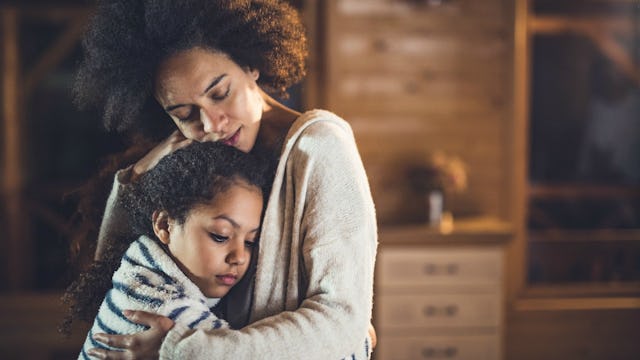I Have Anxiety And I'm Terrified Of Passing It On To My Kids

I’ve dealt with anxiety since my late teens. I spent years not recognizing it for what it was. I always assumed I was just stressed out because of my situation, whether it was an upcoming exam, my grandfather’s health, or whatever was going on at the time. Sure, I went to therapy a few times, but it was always focused on a targeted problem in my life, not on looking at overarching patterns.
After I had my second child at thirty, I finally realized there was a problem beyond just overwhelm. I felt completely out of control once I had two children. I was terrified to go down stairs with them both, envisioning my toddler tripping me and all three of us tumbling down the steps. When my children weren’t both asleep by 7:30 (which was most nights at the time), I took it as a personal failure, enraged both at my girls and myself.
I finally realized this pattern wasn’t healthy for me, and it certainly wasn’t healthy for my daughters. So I started seeing a therapist again, and this time I got some answers.
It turns out I have Generalized Anxiety Disorder (GAD), which basically means I have a tendency to worry all the time, even if there’s not really something to worry about.
For the past two and a half years, I have worked hard to overcome this mental illness. I’ve kept up with therapy. I’ve set some important boundaries in my life. I’ve started yoga. I meditate. Heck, I finally bit the bullet and started anti-anxiety medication.
But you know what?
I still wake up stressed out before I even open my eyes. I still spend some days with that heart-racing gnawing in the center of my chest.
It sucks.
But at the same time, I’m coming to accept that this is something I’ll probably deal with my whole life. Instead of trying to escape the anxiety, I’m slowly learning to embrace it, to breathe through it.
What still scares me though, even after all this work?
The fear that my children will suffer the same way.
GAD has a genetic component. In fact, after reconnecting to my own father a few years ago, I learned that he (and his father before him!) dealt with major anxiety issues.
And now I’ve passed those same genes down to my three beautiful children. It absolutely terrifies me, because there’s nothing I can do to stop it.
This morning, I was leaving for work, and my mind ran to the idea of my children dealing with anxiety. I started thinking about each of their personalities, wondering which one would be most likely to experience this ever-present fear.
I got into the car with my oldest, now a sunny little kindergartner. As we went to school, I thanked her for reminding me that I had forgotten my medicine (yep, the anti-depressant), and she told me how she thought I should make a chart I could check off each day right after I took my pill.
I agreed with her that this was a wonderful idea, and inwardly I marveled at what a little problem-solver she already was at only five years old. Once again, my breath was taken away at the beauty of my child’s mind.
We got to school and I dropped her off. As usual, I was anxious that she took too long struggling out of the car, worried we were annoying the people behind us in line. I tried not to show my stress to her. My heart rate shot up further when I saw a security officer standing at the corner of the school, reminding me of the world we now live in.
As I continued my commute to work, my mind kept working. I don’t want this for my children.
I teared up a little, but held it in, because that’s what I do.
But as I continued thinking, I also remembered how differently I am raising my kids from my own upbringing.
1. I teach my children to name their emotions.
When my two-year-old son screeches angrily, I scoop him up and say, “Wow, you sound really frustrated!”
Or when he shrieks in delight, I cheer with him. “You’re so excited!”
2. I take responsibility for my own emotions and my own actions.
Sometimes if I’ve yelled, my younger daughter will say, “You scared me!”
And instead of saying, “Well, if you didn’t do that I wouldn’t have yelled!” I just respond with, “You’re right, I shouldn’t have yelled, baby girl.”
3. I teach my children coping mechanisms.
I don’t just yell, “Stop crying or I’ll give you something to cry about!”
I go to my child, I look her in the eyes, and I say,“Breathe with me baby girl. Breathe in, breathe out. Breathe in, breathe out.”And we do that as long as it takes.
4. I let them see me take care of myself.
My children see me going to yoga. They see me making healthy food choices. They know I take care of myself.
Through all these actions, I’m helping my children with anxiety in two ways. First, the fact that I regulate my own emotions means that their upbringing is different than mine in many ways. This difference in environment means it’s less likely they will grow up to be anxious.
But perhaps even more importantly, if one or more of my children grow up to have anxiety, they will have been taught the tools to cope.
In fact, in some ways, I’m grateful for my anxiety. After all, if I hadn’t had to deal with it, I would have never had the drive to learn all these coping skills. And that means I would have never had the chance to teach them to my kids.
I just hope it’s enough.
This article was originally published on